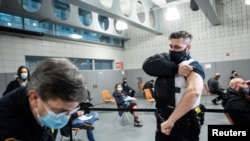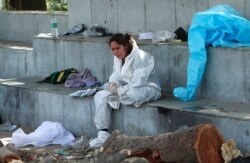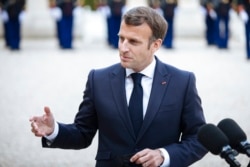The White House said Friday that 100 million Americans had now been fully vaccinated against COVID-19, nearly double the 55 million of a month ago.
White House COVID-19 response coordinator Jeff Zients proclaimed the number a “major milestone” at a briefing.
"That's 100 million Americans with a sense of relief and peace of mind, knowing that after a long and hard year, they're protected from the virus," Zients said.
Every American over 16 is now eligible for the vaccine, and President Joe Biden has promised there will be enough vaccine for every adult American by the end of May.
India in peril
The situation in the U.S. stands in stark contrast to India, where the coronavirus is raging out of control. According to India’s health ministry, only 2% of the country’s population was fully vaccinated as of Thursday. Friday, the health ministry reported 386,452 new infections.
The official daily count of new cases has been over 300,000 for nine consecutive days, but Indian media reports say some public health experts believe the actual tally of new infections may be at least five times higher.
Aid from the U.S. and other countries arrived in India Friday. U.S. assistance includes oxygen supplies, rapid diagnostic tests and vaccine manufacturing materials.
The second wave of the coronavirus has overwhelmed India’s health care system, with hospitals at full capacity and an acute shortage of oxygen aggravating an already desperate situation. Many parks and parking lots have been converted into makeshift crematories that are working day and night to burn dead bodies.
Gayle Smith, U.S. State Department coordinator for global COVID-19 response, said during a Friday briefing that the crisis in India "has not peaked yet."
She added that the pandemic in the country was "going to need urgent and persistent attention for some time."
Smith said most of the requests India had made to the U.S. for oxygen, personal protective equipment and vaccine production materials "have been met," and she called the U.S. response "pretty prompt."
Indian public health experts have blamed the spread on more contagious variants of the virus, plus the easing of restrictions on large crowds when the outbreak appeared to be under control earlier this year.
Any nation vulnerable
Hans Kluge, the World Health Organization’s European regional director, warned Thursday that “It is very important to realize that the situation in India can happen anywhere ... when personal protection measures are being relaxed, when there are mass gatherings, when there are more contagious variants and the vaccination coverage is still low. This can basically create a perfect storm in any country.”
Only the U.S. has more COVID cases than India. As of midday Friday, the U.S. had recorded 32.3 million infections, while India had 18.8 million, according to the Johns Hopkins Coronavirus Resource Center.
In other virus developments:
— French President Emmanuel Macron announced Friday that all French adults would be eligible to be vaccinated starting June 15. Currently, only those with chronic illness are eligible.
— More than a quarter of British health care workers said they were wary of the COVID-19 vaccine, according to a study of National Health Service and care staff. Reasons for their reluctance included several conspiracy theories and the lack of people of color in vaccine trials.
— Vaccine maker Pfizer began exporting doses manufactured at one of its U.S. plants, according to Reuters. The report said the vaccines were sent to Mexico.
— The head of Australia’s drug regulatory agency said Thursday that there was no evidence the AstraZeneca vaccine was responsible for the deaths of two people shortly after their inoculations.
Two men in New South Wales state, including one in his 70s, died within days after receiving the vaccine.
The AstraZeneca vaccine has had a troubled rollout across the world, with many nations suspending its use after reports surfaced of a severe side effect that combines blood clots with low platelet counts following inoculation, plus a handful of deaths.







